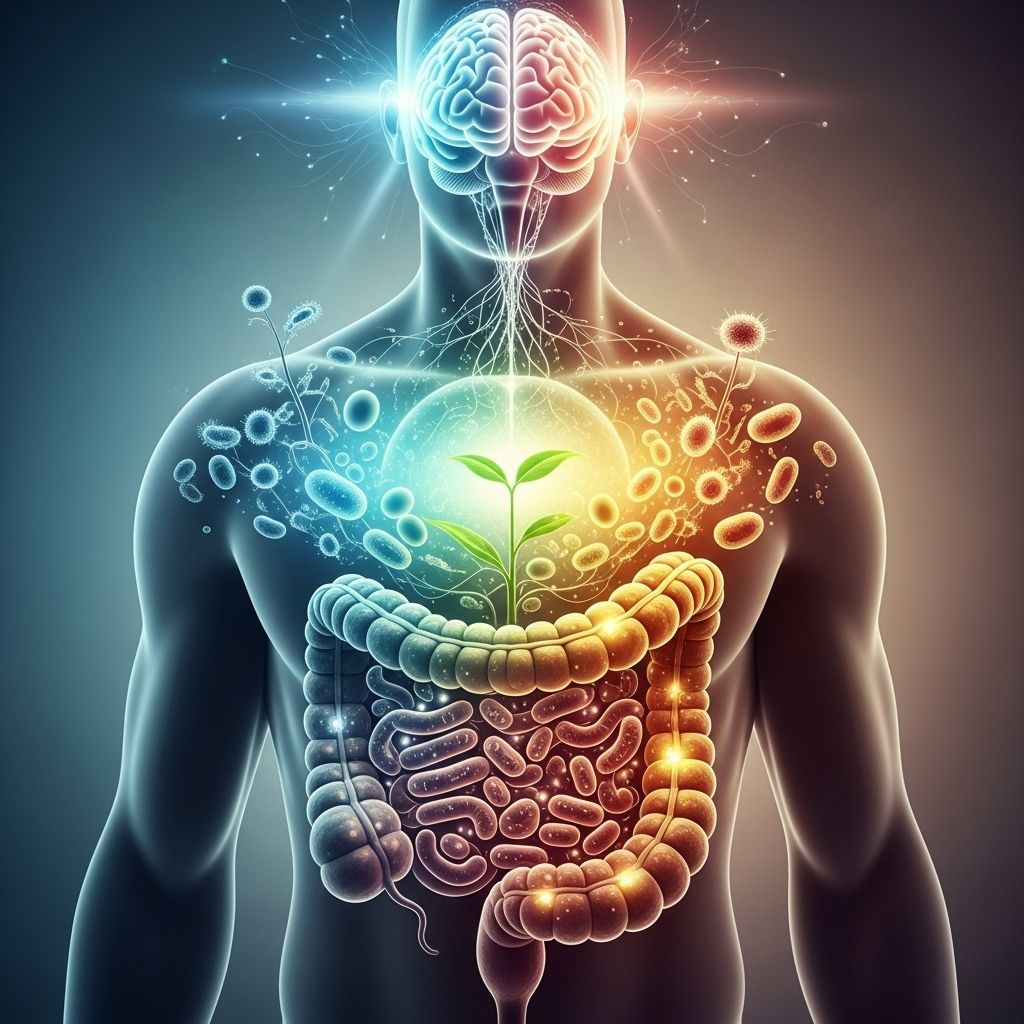Exploring the Gut Microbiome’s Impact on Mood Swings
Gut microbes influence mood swings, while novel treatments work to rebalance emotions.

Table of Contents
- Introduction
- Gut Microbiome and Mood
- Mechanisms of Action
- Therapeutic Interventions
- Frequently Asked Questions (FAQs)
Introduction
The human body is home to trillions of microorganisms, collectively known as the microbiome, with the gut housing the largest and most diverse community. Recent research has illuminated the crucial role of the gut microbiome in influencing various aspects of health, including mental well-being. The microbiota-gut-brain axis is a bidirectional communication network that links the gut microbiome to the brain, affecting mood, cognitive function, and overall mental health. This article explores the correlation between gut microbiome changes and mood swings, discussing the evidence, mechanisms, and potential therapeutic interventions.
Gut Microbiome and Mood
Studies have consistently shown that alterations in the gut microbiota are associated with mood disorders and neuropsychiatric conditions. For instance, a systematic review highlighted significant differences in microbial diversity between individuals with psychiatric disorders and healthy controls. The gut microbiome influences mood through the production of neurotransmitters like serotonin and dopamine, which are essential for mood regulation. Certain bacterial genera, such as Roseburia, Phascolarctobacterium, Lachnospira, and Prevotella, have been linked to positive mood states, while Faecalibacterium, Bifidobacterium, Bacteroides, Parabacteroides, and Anaerostipes are associated with negative mood. Additionally, Prevotella has been implicated in conditions like stress and endometriosis, further underscoring its role in mood disturbances.
Key Bacterial Genera and Their Effects on Mood
- Positive Mood Associations:
- Roseburia and Lachnospira are known for their role in producing short-chain fatty acids, which can enhance mood by promoting gut health.
- Phascolarctobacterium contributes to the metabolism of dietary components that support brain health.
- Negative Mood Associations:
- Faecalibacterium has been observed with high abundance in individuals experiencing negative mood, potentially due to its pro-inflammatory properties.
- Bifidobacterium and Bacteroides are generally beneficial but can contribute to negative mood states when imbalanced.
For those new to the topic of gut health, our Ultimate Beginner's Guide to Gut Health & Microbiome—Science, Diet, and Practical Steps for Better Wellbeing is an essential resource. This guide breaks down complex concepts into actionable steps, empowering you with knowledge to enhance both your gut health and mental clarity.
Mechanisms of Action
The gut microbiome communicates with the brain through several mechanisms, including the production of neurotransmitters and hormones, modulation of the immune system, and influence on the enteric nervous system. For example, certain bacteria can produce neurotransmitter precursors like tryptophan, which is converted into serotonin in the brain, a key regulator of mood. Additionally, the gut microbiome affects the integrity of the gut barrier, influencing the levels of inflammatory markers that can impact brain function and mood.
Role of Short-Chain Fatty Acids (SCFAs)
SCFAs, produced by the fermentation of dietary fibers by gut bacteria, play a crucial role in gut health and mood regulation. They can enhance epithelial barrier function, suppress inflammation, and stimulate the release of hormones that influence mood.
Therapeutic Interventions
Given the influence of the gut microbiome on mood, therapeutic interventions targeting gut health are gaining attention. Probiotics, which are live bacteria and yeasts that are beneficial for health, have been shown to improve mood and reduce symptoms of depression and anxiety. Dietary changes, such as increasing fiber intake to support beneficial bacteria, are also recommended. Moreover, emerging treatments like fecal microbiota transplantation (FMT) hold promise for addressing microbiotal imbalances associated with mood disorders, though more research is needed to fully understand their efficacy.
Potential Therapies and Future Directions
Future research should focus on large-scale human trials to elucidate the causal relationships between specific microbial taxa and mental health outcomes. This could lead to personalized microbiome-based therapies tailored to individual microbiotal profiles and psychological conditions.
Frequently Asked Questions (FAQs)
Q: What is the gut microbiome?
A: The gut microbiome is the collective community of microorganisms living in the gastrointestinal tract, playing a crucial role in digestion, immune function, and mental health.
Q: How does the gut microbiome affect mood?
A: The gut microbiome influences mood through the production of neurotransmitters and hormones, modulation of inflammation, and communication with the brain via the gut-brain axis.
Q: Can diet affect the gut microbiome?
A: Yes, dietary changes such as increasing fiber intake can support beneficial bacteria, potentially improving mood and mental health.
Q: What are probiotics?
A: Probiotics are live microorganisms that confer health benefits when consumed, often used to support gut health and alleviate symptoms of mood disorders.
Q: Are there any potential risks of gut microbiome therapies?
A: While generally considered safe, therapies like probiotics and FMT can have side effects and should be used under medical supervision, especially in vulnerable populations.
Read full bio of medha deb












